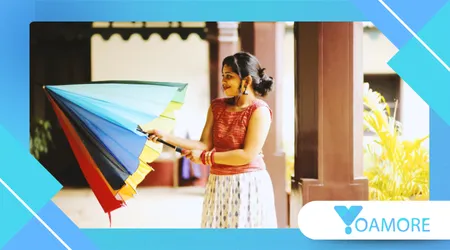Why Opening Umbrellas Indoors Is Considered Bad Luck

Have you ever wondered why opening umbrellas indoors is considered bad luck? The superstition is a classic, but its origins are shrouded in mystery and folklore.
Anúncios
This article will delve into the historical roots and psychological reasons behind this well-known superstition, exploring its journey from ancient beliefs to modern-day practices.
We’ll also examine the cultural significance and practical considerations that have kept this belief alive through generations, all while providing a fresh perspective on a familiar topic.
The Curious Origins of a Common Superstition
The superstition that opening umbrellas indoors is considered bad luck is one of the most persistent and widely recognized folk beliefs in Western culture.
While it might seem irrational to us today, its origins are deeply rooted in historical contexts where umbrellas were more than simple rain-guards.
Anúncios
They were often viewed as powerful symbols, and their use was tied to specific rituals and beliefs.
One of the most compelling theories traces the superstition back to Ancient Egypt. In this time, umbrellas, or parasols, were not for rain but were a mark of nobility and divine protection.
They were used to shielding royalty from the sun’s harsh rays, symbolizing the protection of the gods.
To open one indoor, away from the sun, would have been seen as an insult to the sun god Ra.

This act was believed to provoke the wrath of the gods, leading to misfortune for the person and potentially their entire household.
The belief was that by opening a divine shield where it was not needed, you were essentially tempting fate and inviting a protective deity to abandon you.
+ The Forgotten French Revolution That Happened in Haiti
Another theory, perhaps more practical, links the superstition to the 18th-century English streets. At this time, umbrellas were large, clumsy, and often had stiff metal spokes.
Opening one of these contraptions inside a small, crowded home or a public building was a genuine hazard.
The sharp spokes could easily poke someone in the eye or knock over fragile objects.
The superstition, therefore, may have served as a form of social conditioning—a gentle, folkloric warning to prevent people from causing a genuine safety hazard.
It’s a classic example of how a practical caution can evolve into a deep-seated superstition. The belief spread as a way to promote safety, becoming an unwritten rule of etiquette in an era before clear safety regulations.
From Myth to Modernity: The Psychology Behind the Belief
Superstitions persist because they serve a psychological purpose. They provide a sense of control over an unpredictable world.
When something bad happens, it’s frequently easier to attribute it to a specific, avoidable action—like opening umbrellas indoors is considered bad luck—rather than accepting that it was a random event.
This cognitive bias, known as illusory correlation, makes us perceive a connection between two things that are not actually related.
This is a powerful psychological mechanism. Consider a person who opens an umbrella inside and then, later that day, receives an unexpected bill.
Their mind might automatically link these two events, creating a memorable, if unfounded, association.
Even if a thousand times before nothing happened, the one time a negative event occurred is the one that sticks in their memory.
This is a form of confirmation bias, where we seek out information that confirms our pre-existing beliefs. We are more likely to remember and share stories that support the superstition, reinforcing it for ourselves and others.
In a 2023 study published in the journal Psychological Science, researchers found that superstitions often provide a sense of agency and comfort, particularly in situations of high uncertainty.
The study, which observed participants in stressful, high-stakes tasks, noted that those who engaged in superstitious behavior reported feeling more in control and less anxious.
This suggests that the belief that opening umbrellas indoors is considered bad luck isn’t just about a fear of a magical curse; it’s about a desire for predictability and a way to externalize feelings of helplessness.
+ The Connection Between Astrology and Cultural Beliefs
The Global Scope of Superstitions
While the belief that opening umbrellas indoors is considered bad luck is prominent in Western cultures, variations of this superstition can be found globally, often tied to local customs and beliefs about luck and misfortune.
It serves as a reminder that human beings universally seek patterns and meaning, even in the most mundane actions.
This is why we have so many superstitions related to everyday objects and actions, such as spilling salt or breaking a mirror.
For example, in many parts of Asia, certain numbers or colors are considered unlucky, and specific actions, like pointing with a single finger, can be seen as rude or inviting bad fortune.
In Russia, whistling indoors is believed to cause financial hardship. These beliefs, like the umbrella superstition, are regularly passed down through generations, serving as cultural touchstones and a way to connect with the past.
The table below shows a comparison of superstitions related to common household items across different cultures.
| Item | Culture | Superstition |
| Salt | Western Cultures | Spilling salt and not throwing it over your left shoulder is bad luck. |
| Ladder | Various | Walking under a ladder is considered bad luck. |
| Mirror | Various | Breaking a mirror brings seven years of bad luck. |
| Scissors | China | Giving scissors as a gift is said to cut off a friendship. |
| Umbrella | Western | Opening umbrellas indoors is considered bad luck. |
The belief that opening umbrellas indoors is considered bad luck is a fascinating example of how a simple act can be imbued with a rich tapestry of cultural and psychological meaning.
This is why, even if we intellectually know there’s no real danger, a part of us might still hesitate to pop an umbrella open inside, just in case.
A Modern Take: The Fun and Folly of Folklore
In an age of science and logic, what role do these superstitions play? They are, in many ways, a fun, harmless link to our shared history.
They provide a common reference point and a bit of playful folklore that we can all share.
The superstition also serves as a subtle reminder of the power of our minds and the way our beliefs can shape our perception of reality.
We may not fear divine punishment anymore, but the habit of caution remains.
Consider the simple analogy of a digital backup. You might save your work to the cloud and a physical drive, even though the probability of both failing is incredibly low.
Why do you do it? Because it provides a sense of security and control. Similarly, avoiding opening umbrellas indoors is considered bad luck is a tiny, almost subconscious act of control.
It’s a way to hedge against the unpredictable, a small gesture to ward off unknown misfortunes. It’s a bit of magic in an increasingly rational world.
The fact that so many people know and adhere to this superstition, even if just for a moment, speaks to its powerful cultural resonance.
A quick search on the web reveals countless discussions and articles, showing a sustained interest in this topic.
This widespread fascination is a testament to the human desire for narrative and meaning. For more on the history of superstitions, you can visit the American Folklore Society’s website, an excellent resource for anyone interested in the topic.
So, the next time you’re about to open an umbrella inside, take a moment to appreciate the centuries of history and human psychology that have shaped this simple act.
It’s a window into how we’ve made sense of the world, from ancient fears to modern-day anxieties.
Conclusion
The superstition that opening umbrellas indoors is considered bad luck is a rich blend of history, psychology, and culture.
It has evolved from ancient beliefs about divine protection and practical concerns about physical safety to a modern-day psychological quirk.
While we no longer believe that a sun god will curse us, the superstition persists as a quirky habit and a reminder of our enduring human need for order and control.
The next time you find yourself about to open an umbrella inside, you might just reconsider, if only to participate in a piece of shared human folklore.
FAQs about Superstitions
Q: Is there any scientific evidence to support the idea that opening an umbrella indoors is bad luck?
A: No, there is no scientific evidence to support this superstition. The belief is rooted in historical, cultural, and psychological factors, not in any verifiable cause-and-effect relationship.
Q: Are there other superstitions about umbrellas?
A: Yes, in some cultures, dropping an umbrella is believed to bring bad luck. Conversely, some traditions suggest that if you find an umbrella, it is a sign of good fortune.
Q: Why do superstitions persist in modern society?
A: Superstitions provide a sense of control in an uncertain world. They offer a simple explanation for complex events and can reduce anxiety. They are also a way to connect with and continue cultural traditions. To learn more about the psychology of superstitions, you can check out this article from the Journal of Psychology.
